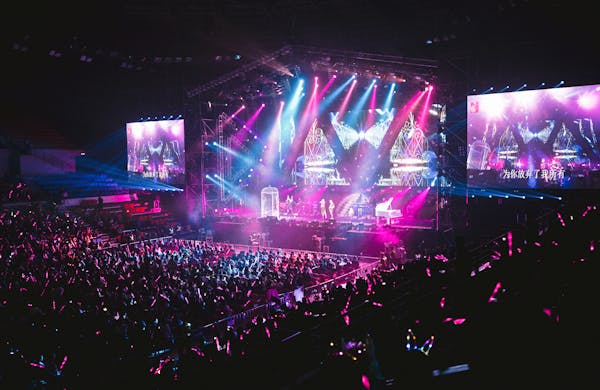10 AI Tools for Event Management
Valued at 936 billion USD in 2023, the global event management industry is one of the most fertile fields for application and expansion of AI technology. Every growing industry adopts latest technological advancements at its disposal. And the event management sector is one of the most promising ones poised for growth – with over 11% CAGR, the sector is projected to touch USD 1.76 trillion by 2029. In the context of a growing event management industry, applications of Artificial Intelligence have turned into effective tools that can foster planning, conducting, and evaluation processes. These tools can help make work easier by automating work, making the experience for attendees better, and crafting analytics about the event. With the further development of the industry, its use can create a competitive advantage.
Here, we are going to outline and describe 10 of the most useful tools for AI in event management, their main functionalities, advantages, and costs.
AI Companies in Boston, MA, US
Top AI Tools for Event Management
1. Eventbrite
Overview: Eventbrite is a renowned exemplar of a platform intended for easing event organization with the help of artificial intelligence technologies. It offers a perfect solution for selling tickets, advertising the event, and engaging the participants.
Features:
Integrated and individual event pages
Automated ticketing
Registration, advanced marketing, and promotions
Information and analytical services
Pricing: Pricing varies on the basis of many factors and huge event discounts for the large number of orders are provided.
Details: Working in the background, all machine algorithms of Eventbrite will help the firm in identifying attendee characteristics and shall give a recommendation on targeted marketing strategies, ticket pricing, and anticipated sales. It is easy to use and is equipped with strong analyzing tools, thus, making it preferred for either small or big functions.
2. Bizzabo
Bizzabo is an AI enabled event management site that concerns itself with the achievable return on investment in events and the customized experience to be provided to the attendees. This effectively translates to increased engagement and enhanced performance of events.
Features:
ticketing
registration for the event
personalized schedules
matchmaking features
analytics
Pricing: Priced
Details: Intelligent artificial algorithms of Bizzabo analyze the behavior of the attendees and show them content and interaction options. In relation to advertising it can be used in measuring the level of perceived effectiveness of an event and marketing communication activities in improving the satisfaction of the audience.
3. Social Tables
Overview: Social Tables concentrate on venues and seating arrangements with the assistance of artificial intelligence for the floor plan and guest list of the event. It is meant for event planning help to manage events with an amazing level of detailed attention.
Features:
interactive floor plans
guest list updating in real-time
options to choose where you want the guests to sit (seating arrangement)
managing a venue
Pricing: Priced
Details: The ever-reactive transformations made by Social Tables’ functioning AI help in facilitating alterations to seating and guest flow. As such, it is particularly applicable for the purposes of organizing big events and creating a system of seating.
4. Whova
Overview: Whova is a mobile app that allows and helps event organizers manage the events while boosting the participation of the attendees. The application gives a number of solutions that are very useful for both virtual and live events.
Features:
mobile application with an event program
catering for attendees
attendees’ interactions
speaker interactions
feedback gathering
Pricing: Priced and additional fees for extras and for an increased number of participants.
Details: Through the utilization of artificial intelligence, Whova makes suggestions for sessions and opportunities for networking according to the attendee’s preferences and activities. The platform also allows users to obtain effective feedback from attendees that would be useful for the subsequent organization of events.
5. Zkipster
Overview: The next multiple-functioned application for event management is Zkipster for guest management and check-in through artificial intelligence. It provides a mechanism for organizing guests and responses electronically.
Features:
electronic guest list
check-in
analytics of guests
Pricing: Priced and includes additional fees for special offerings.
Details: Using AI, Zkipster eliminates features that concern check-in while allowing clients to get real-time updates on the guests’ attendance records. As a result of its security and effectiveness, it can be used in programs, where the guest handling must be smooth.
6. Attendify
Overview: It is an event app that aims at increasing engagement of attendees with the use of Artificial Intelligence and analytics to dissect content. It entails the concept of the construction of the participants’ individual environments.
Features:
mobile event app
communication platforms
event schedule customization
surveys
Pricing: Priced
Details: AI makes Attendify remarkable as it increases the satisfaction levels of the attendees by recommending sessions that they may be interested in along with recommended networks of people they may know. It also gathers post-remembrance to enable the organizers to evaluate the event’s accomplishments and its shortcomings.
7. MeetingPlay
Overview: The popular MeetingPlay applies to virtual as well as on-site events using event technology and AI. Here, it is focused on the intensification of participation of the attendees and moderating of the content.
Features:
virtual events
support for blended events
engagement
content management
analytics
Pricing: Priced
Details: In enabling a smooth integration of both the virtual and physical event dimensionality, MeetingPlay possesses AI tools. There are insights on attendees’ behavior and activity which will enable the organizers to determine the performance of an event.
8. Hubilo
Overview: Hubilo is a complete event management platform where the incorporation of AI is used to enhance not only virtual but also hybrid events. There are features of interacting with audiences, patterns of disseminating information, and inherent features for gathering statistics.
Features:
event management
networking tools
live streaming
attendee engagement
advanced analytic tools
Pricing: Priced
Details: The AI tools of Hubilo are personalized schedules for events and networking matchmaking. It offers intrusive analytics which assists organizers in evaluating the level of attendees’ involvement and adjusting event tactics, making it a multiformat platform.
9. Swoogo
Overview: Swoogo is a flexible and AI-enabled event management software with useful and tailored services according to the needs. It provides facilities for the registration of events, event marketing, and even data analytics.
Features:
event registration management
ability to customize event website
automation of marketing and sales
data analytics
Pricing: Priced
Details: One of the marketing automation activities that Swoogo employs is providing insightful information regarding attendees’ behavior.
10. Aventri
Overview: Aventri has a well-developed event management software that integrates artificial intelligence to deliver all-rounded event management solutions. It has features for registration, marketing, and management of the attendees.
Features:
registration & ticketing
applications to support the event
engagement of attendees
analysis of attendee information
Pricing: The service charges differ with the number of people to be served together with other relative aspects of the event.
Details: The Artificial Intelligence capabilities of Aventri help manage an event from scratch to its end by initiating the registration process and with detailed analysis. Its approach assists the organizers to make the right decisions and enhance the achievements of the events.
Summing it Up
We can conclude that the application of AI solutions in event management has become a standard given the benefits that it provides on the technological front. Including ticketing, registration, guest management, and especially personalized experience, this list includes ten AI tools to fit the various types of event services. Incorporation of these technologies makes it possible for event organizers to manage and maximize attendee interactions leading to the success of the events.







